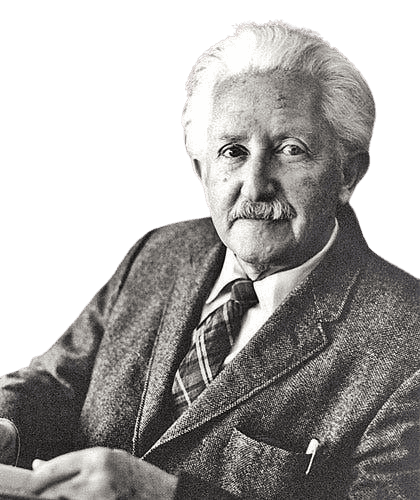Life and achievements
Early life
Erik Erikson was born Erik Homburger in Frankfurt, Germany, on June 15, 1902. He was born into a somewhat disturbed family background; his biological father left the family before Erik's birth. His mother later remarried Dr. Theodor Homburger, whom Erik thought was his birth father until he was about 15.
Such early experiences of identity confusion, along with growing up in a Jewish home but looking like a Nordic, made Erikson a stranger to himself, which determined his lifelong interest in the concept of identity and its development.
While Erikson was interested in arts, he pursued psychology after relocating to Vienna in his young adulthood. He went there and joined Anna Freud, Sigmund Freud's daughter, and trained in psychoanalysis. This education formed the basis of his subsequent practice, in which he integrated psychoanalytic techniques with a more global view of the sources of developmental disturbance.
He faced the issues of displacement and identity crisis, and his personal experiences shaped his research, especially on identity formation during adolescence. He had to flee from the rise of the Nazis in his native country, and in 1933, he moved to the United States after his marriage to Joan Serson, a Canadian dancer.
He was a professor at Yale University, Harvard University, and the University of California, Berkeley, where he conducted significant research on children, identity, and culture. His cross-cultural study, especially with Native Americans, taught him how the social environment influences identity. The observations and studies he made in his lifetime would later contribute to formulating his psychosocial development theory.
Legacy
Erik Erikson has given so much to psychology that his theory of psychosocial development is not the only thing he has done. He significantly contributed to education, counseling, and psychotherapy concerning identity and context.
The term "identity crisis" has persisted in becoming part of the standard language. It is still used in psychology and society to refer to the significant issues people encounter while determining their identity.
Erikson also extended the focus of developmental psychology by stating that personality development continued throughout life, in contrast to Freud's theory that development was mainly complete in early adulthood.
Erikson's stages of psychosocial development were the theoretical basis for how people develop in the social context. His ideas help educators understand the development of a child and help therapists deal with patients who are going through a period of change or identity crisis. They can be used in social work, family therapy, education, and many other areas that deal with human development and offer people tools to cope with the issues arising in this process.
Erikson also contributed a lot to cross-cultural research and worked with different ethnic and cultural groups, such as Native Americans, which made him understand that culture plays a crucial role in development.
His work in this area was psychological, anthropological, and sociological, which contributed to the development of knowledge about culture and society in relation to individuals' identities. Today, his work is a reference material in developmental psychology classes and is still applied in studying identity, mental health, and social factors in personality development.
Join Confinity today to protect your digital privacy and take control of your online presence. Signup Now
Learn how historical figures leave behind lasting legacies that shape culture →
Milestone moments
Feb 15, 1933
Migration to the United States
Erikson had to emigrate to the United States in 1933 with his family because of the increasing danger posed by the Nazis in Germany. This change was a turning point in his life as he left Europe behind and became an academic in the United States of America.
On coming to the U.S., Erikson joined Yale University and started to integrate psychoanalysis with cultural anthropology.
This was crucial in the development of Erikson's work on identity, as he was exposed to different cultures and understood how identity develops in different social contexts.
The immigration experience also enriched Erikson's individual and occupational search for identity, displacement, and the role of the social environment in human growth.
May 16, 1950
Publication of Childhood and Society
The theory of psychosocial development was first discussed in Erik Erikson's book Childhood and Society, published in 1950. The book gained popularity and acclaim and established Erikson as one of the crucial figures in developmental psychology.
In Childhood and Society, Erikson presents the concept of personality development, which takes place through eight stages in the lifespan, and a psychosocial crisis characterizes every stage.
The book's publication became the turning point in the development of psychology as the focus of development shifted from childhood, and social factors were highlighted more.
This work made Erik Erikson a giant in the field of psychology, and his concept of developmental stages continues to form the basis of developmental theory.
Jan 19, 1963
Ethnography of Native American Peoples
Early in the 1960s, Erikson conducted extensive fieldwork with two tribes of Sioux and Yurok Indian peoples. Through his observations of these cultures, he developed a perspective of how social and cultural factors shape identity and development.
Erikson's work with these Indigenous groups emphasized the use of culture in creating identity.
This milestone demonstrated Erikson's intention to make anthropology in developing theories across cultures.
They helped him in his future research on identity development and gave him a wealth of information about the different modes of psychological development in human beings.
May 16, 1968
Publication of Identity: Youth and Crisis
Erikson's 1968 publication of Identity: Youth and Crisis continued his work, focusing on the issue of identity, including the crisis that teenagers experience. It became a critical text in developmental psychology and education.
In this work, Erikson introduced the term "identity crisis," which he used to refer to the stage of confusion that adolescents experience.
The book impacted psychology and education by offering a framework for the psychological issues of adolescents and young adults.
This stage established Erikson as the premier theorist on identity and development, and it shaped the current understanding of identity formation.
